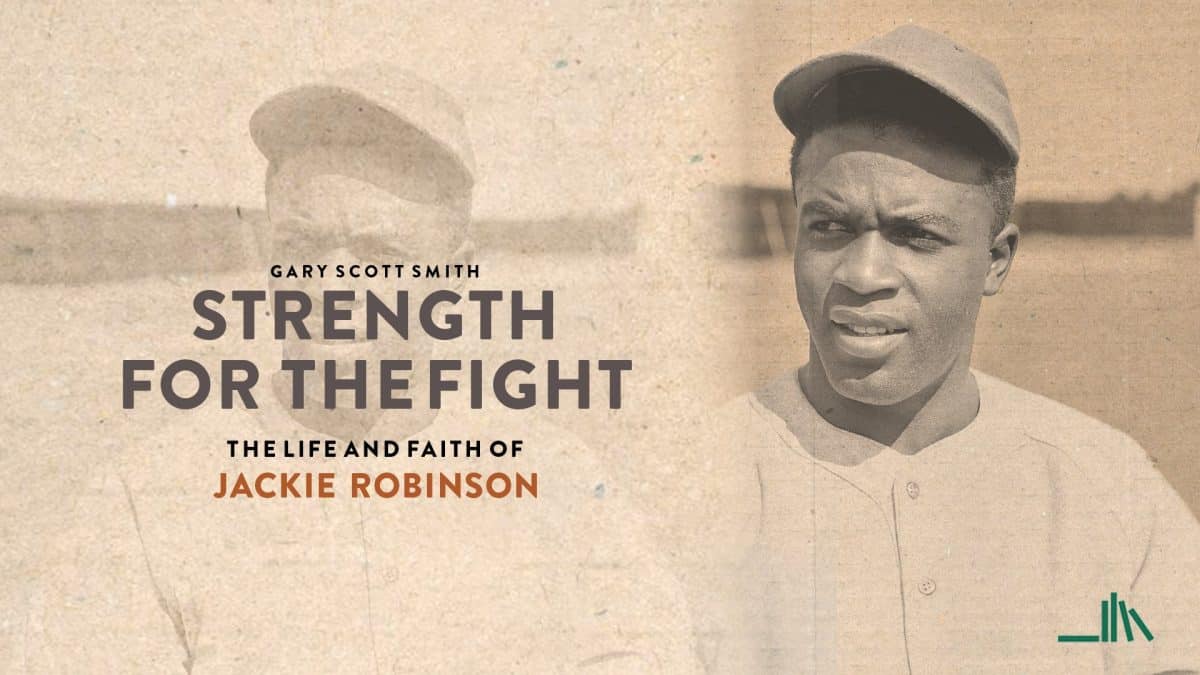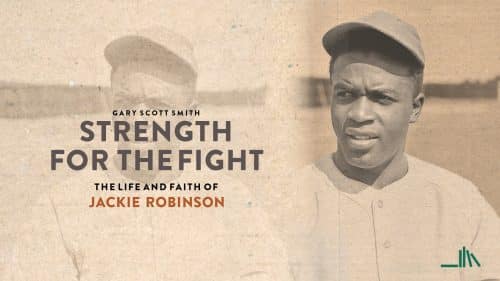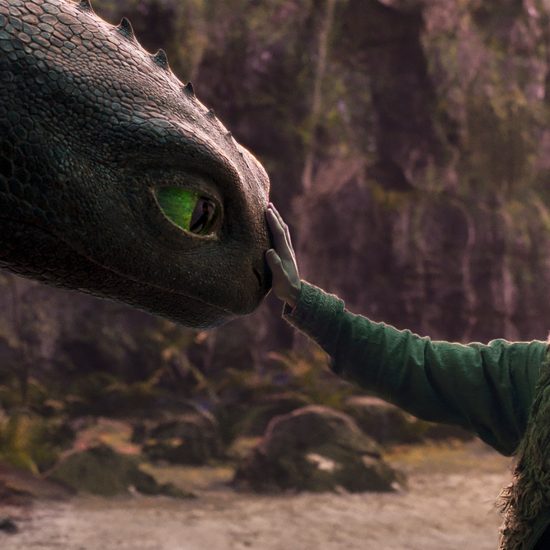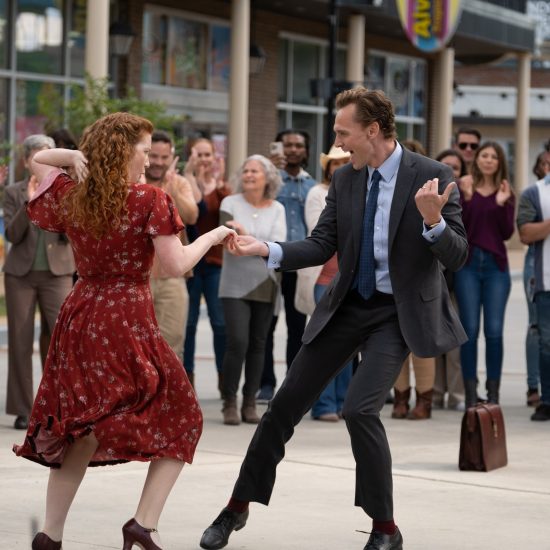

STRENGTH FOR THE FIGHT: The Life and Faith of Jackie Robinson. (Library of Religious Biography). By Gary Scott Smith. Grand Rapids, MI: Wm. B. Eerdmans Publishing Company, 2022. Xiii + 298 pages.
Prior to the 1947 season, Major League Baseball was a whites-only affair. There wasn’t anything in the by-laws of the leagues, but it was a “gentleman’s agreement” that no team would sign black players (this ban included all possible players with darker skin). While the major leagues and even the minor leagues offered a white-washed product, many capable Black players could have played alongside Ty Cobb and Babe Ruth long before Robinson broke through the color barrier, but these players were consigned to play in the alternative Negro Leagues. Those leagues produced some excellent players, players who if they had been in the American or National Leagues, would have been numbered among the best that played the game, but they remained largely unknown to the larger population. Think of players like Satchel Paige and Josh Gibson. Paige did get to play in the Majors, but long after his heyday, Gibson was no longer playing (and he would die in 1947). That ban finally fell in 1947 because Branch Rickey, then the President of the Brooklyn Dodgers decided it was time to cross the invisible line and integrate America’s so-called pastime. The question was, who should he turn to make this happen? It would take a special person to take on the challenge because resistance and opposition likely would be fierce and possibly even violent.

Robert D. Cornwall
As the world, especially the United States entered the postwar era, things were changing. Harry Truman had integrated the military after the war, and change was in the air elsewhere. So, enter Jackie Robinson. Robinson had served in the army during World War II, becoming an officer. Before the war, he had attended Pasadena Junior College and UCLA, where he had been a sports star. Besides baseball, he was an accomplished football and basketball player, as well as a track star (long jump). Here was a military officer, someone who attended college, and was proficient as an athlete. These were prime qualities for someone who might be chosen to pave the way for others to enter a sport previously off-limits to people of color (at least in terms of the Major Leagues). Robinson had one other quality that made him attractive to the very religious Branch Rickey. That was the fact he was a person of faith. He was a Methodist, just like Branch Rickey. Yes, he was the perfect person to take up this calling. It’s been seventy-five years since Robinson broke the color barrier. While baseball might not be as popular today as it was in the 1940s, it remains symbolic of American life. So it’s fitting that his story is told once again for current and future generations.
Jackie Robinson’s story has been told many times before. In fact, I read and reviewed an earlier book that explored Robinson’s faith and his decision to take up Rickey’s call to be the first Black Major Leaguer. That book is Michael Long and Chris Lamb’s Jackie Robinson: A Spiritual Biography: The Faith of a Boundary-Breaking Hero by Michael Long and Chris Lamb. I thoroughly enjoyed that book, which covered much of the same ground as Strength for the Fight: The Life and Faith of Jackie Robinson. This volume is the latest contribution to the prestigious Eerdmans Library of Religious Biography. Both biographies emphasize Robinson’s faith as well as his baseball exploits, and both are worth reading. Thus, we are blessed to have such excellent reflections on the connection of faith to important moments in history.
The author of Strength for the Fight: The Life and Faith of Jackie Robinson is Gary Scott Smith. He is professor of history emeritus at Grove City College. He is the author of eighteen books and in 2001 he was named the Pennsylvania Professor of the Year by the Carnegie Foundation for the Advancement of Teaching. Among his other books is a biography of Winston Churchill and a book exploring Religion in the Oval Office. I was impressed, as I read the book, at Smith’s evenhandedness in telling this important story. In other words, he didn’t make Robinson out to be a saint nor did he diminish the accomplishment.
Throughout this biography, Smith highlights Robinson’s role as a trailblazer and the challenges he faced before, during, and after his history-changing decision to become the first black to play in the major leagues since the late 19th century. While Smith highlights the many ways in which Robinson broke new ground for others, he also seeks to address the myth/legend surrounding Robinson. By doing this, Robinson can be seen as the person he was in life—a brave human being who blazed the trail for others, with his faith providing the anchor. While Robinson was the first to cross this line, others quickly followed after him even if it came slowly. Before the 1947 season was half over, Larry Doby joined the Cleveland Indians and integrated the American League. Others quickly followed in their footsteps. One thing that Smith wants us to know is that not only did Robinson integrate baseball, changing baseball forever, but his willingness to do this proved to be a giant step for the civil rights movement in the United States. Because of his demeanor and professionalism, together with his athletic prowess, he made it possible for others to follow in his footsteps. That opened other doors in society. That he was chosen to be the first to cross the line was because he possessed the qualities necessary to make this happen. In other words, he was willing to persevere so that others might follow. It was his faith that gave him the strength to do this. When he struggled with this call, something that happened regularly, Rickey reminded him of his faith and the path Jesus took before him.
One of the myths surrounding Robinson suggests that he was not affected by the abuse and threats that he faced, especially in those early months. The same is true of the fact that in many cities he couldn’t stay with the team. He tried not to let on that he thought about giving up on regular basis. He was, after all, a very proud man who struggled with Rickey’s requirement that he not fight back. You can understand why that was true. When he thought about giving up or giving in, Rickey would draw upon their common faith, something that linked the two men, to encourage him to go the distance and not give up.
It’s dumbfounding to read about the horrific treatment directed at him. Not only did he face hostile crowds who didn’t believe he should be there, but he had to deal with opposing managers and players who tried to run him off the field. The opponents would heckle him from the dugout, pitchers threw at his head, and baserunners tried to spike him. Reading this may shock some people, perhaps the way the Roots mini-series did for many of us in the 1970s. This book comes out not only as the seventy-fifth anniversary of this historic moment but at a time in American history when many whites have begun resisting the narrative that highlights the roadblocks faced down through the years by people of color. So, for some readers, this book will prove challenging. That’s because the picture painted here of American culture in the not-too-distant past is not pretty. It’s not just the baseball field where Robinson faced resistance. We see this in his experiences in the Army as well. Nevertheless, as we read the book, we see Robinson drawing on a very deep faith. Thus, he persevered as he navigated this moment in history.
When it comes to the Christian faith, it should be noted that Robinson was not an evangelical. Rather, he was a progressive Mainline Protestant. Although he originally was a Methodist, he ended up in the United Church of Christ. While it was his prowess on the field that allowed him to play baseball, he used that platform to further the cause of civil rights. He took advantage of opportunities to speak and write columns for both black and white-owned papers. He was friends with Martin Luther King, Jr. and Jesse Jackson and supported their work. He was also a friend and supporter of the liberal Republican governor of New York, Nelson Rockefeller. While he supported King’s work, he differed with him on the Vietnam War, at least until the early 1970s. That had a lot to do with the influence of Rickey’s anti-communism on him. Thus, Smith not only covers baseball and faith but also Robinson’s involvement in American politics.
As we ponder Jackie’s role in all of this, Smith also highlights the important role played by his wife Rachel Robinson. She was an accomplished person in her own right, pursuing a career as a nurse and later as a psychiatric nurse. She walked with him during his most challenging moments and proved to be a person of courage and determination. After his death, she founded several institutions to carry on his legacy. We’re fortunate that Smith highlights and celebrates her life story, even as he focuses on the life of her husband. In many ways, she was one of the keys to his ability to survive and navigate trying times.
While baseball may not be as important to American life as it was at the midpoint of the twentieth century, the legacy of Jackie Robinson lives on. He paved the way for people like Willie Mays, Hank Aaron, and many more. Baseball and the nation are better for what he undertook, proving Branch Rickey right. To know that faith was central to all of this is important to note. Thus, we can be thankful that Gary Scott Smith took up the task by writing his biography of Robinson, the very excellent Strength for the Fight. The book comes, as I noted above, at the right moment, at a moment that many in the United States have forgotten how difficult it has been, and in many ways still is, for people of color to navigate a nation that has been defined by people of European descent. Thus, this is an important read not only for sports fans or those interested in the relationship between faith and sports but because it speaks to the centrality of civil rights to Robinson’s legacy.
This review originally appeared on BobCornwall.com.
Robert D. Cornwall is an ordained minister in the Christian Church (Disciples of Christ). Now retired from his ministry at Central Woodward Christian Church (Disciples of Christ) of Troy, Michigan, he serves as Minister-at-Large in Troy. He holds a Ph.D. in Historical Theology from Fuller Theological Seminary and is the author of numerous books including his latest books: Called to Bless: Finding Hope by Reclaiming Our Spiritual Roots (Cascade Books, 2021) and Unfettered Spirit: Spiritual Gifts for the New Great Awakening, 2nd Edition, (Energion Publications, 2021). His blog Ponderings on a Faith Journey can be found at www.bobcornwall.com.






